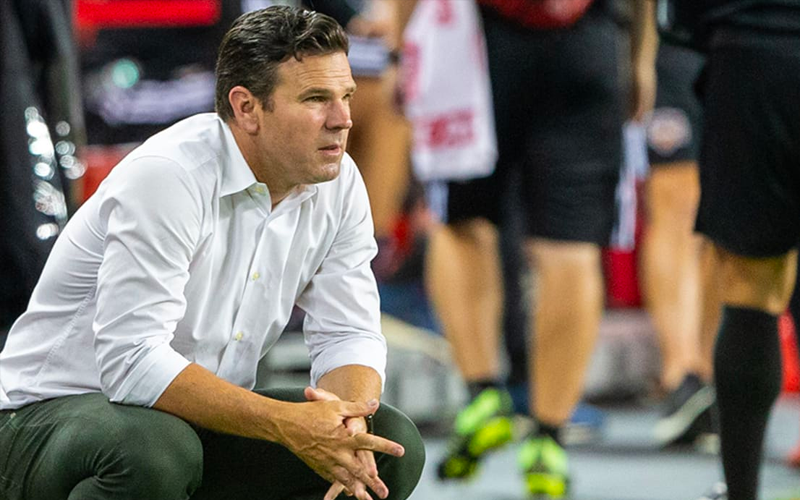Major League Soccer has grown exponentially over the past two decades, and with its expansion, the coaching landscape has become more diverse and competitive. While some coaches have experienced tremendous success, others have struggled to make their mark in the league. This article examines the factors behind these successes and failures, shedding light on the dynamics of coaching in MLS.
The Importance of Adaptability
One of the most crucial factors determining a coach’s success in MLS is their ability to adapt. The league features a diverse array of playing styles, tactical approaches, and varying levels of talent. Coaches who can quickly adjust their strategies to exploit opposition weaknesses or accommodate their own squad’s strengths are more likely to succeed.
Adaptability also extends to navigating the unique challenges of MLS, such as the salary cap, roster restrictions, and extensive travel. Coaches who can effectively manage these constraints are better positioned to build competitive teams and maintain consistency throughout the season.
Case Study: Peter Vermes
Peter Vermes, head coach of Sporting Kansas City, is a prime example of adaptability. Since taking charge in 2009, Vermes has consistently guided his team to the playoffs, despite operating with a smaller budget compared to other clubs. Vermes has achieved this success by developing a strong academy system, unearthing hidden gems in the draft, and effectively utilizing his resources.
Building a Winning Culture
A winning culture is essential to fostering long-term success in MLS. Coaches who can instill a strong work ethic, create a positive team atmosphere, and maintain high standards of professionalism are more likely to achieve consistent results. Players respond well to coaches who can inspire and motivate them, both on and off the field.
Case Study: Bruce Arena
Bruce Arena, one of the most successful coaches in MLS history, is renowned for his ability to create a winning culture. With five MLS Cup titles to his name, Arena has demonstrated an uncanny ability to get the best out of his players. His emphasis on discipline, hard work, and teamwork has enabled his squads to achieve sustained success over the years.
Tactical Acumen
Tactical knowledge is another critical factor in determining a coach’s success in MLS. A deep understanding of the game, coupled with the ability to devise effective game plans, is essential for staying ahead of the competition. Coaches who can consistently outthink their opponents and make in-game adjustments are better positioned to achieve positive results.
Case Study: Bob Bradley
Bob Bradley, the head coach of Toronto FC and former coach of Los Angeles FC, is widely regarded as one of the top tacticians in MLS. Known for his meticulous attention to detail, Bradley has built a reputation for developing innovative tactical systems that maximize his team’s potential. His ability to analyze opponents and devise effective strategies has been instrumental in LAFC’s rapid rise to prominence.
Reasons Behind Coaching Failures
Conversely, there are several factors that can contribute to a coach’s failure in MLS. In some cases, coaches struggle to adapt to the unique challenges of the league, such as the salary cap, roster restrictions, and the diverse player pool. Others may lack the tactical acumen or man-management skills necessary to succeed at the highest level.
Case Study: Frank de Boer
Frank de Boer’s short-lived tenure as Atlanta United’s head coach highlights some of the factors that can lead to failure in MLS. De Boer struggled to adapt to the league’s unique challenges, and his rigid tactical approach failed to mesh with Atlanta’s talented roster. The result was a dip in performance and eventual departure after just a season and a half in charge.
The Role of Club Support and Stability
A coach’s success in MLS is also heavily influenced by the level of support and stability provided by the club’s management and ownership. A strong and stable front office allows coaches to focus on their primary responsibilities, such as developing players and implementing tactics. In contrast, clubs with a lack of continuity or poor decision-making at the executive level can hinder a coach’s ability to succeed.
Case Study: FC Dallas
FC Dallas serves as an example of a club that provides its coaches with a stable environment and strong organizational support. Their commitment to youth development, a strong academy system, and a clear playing philosophy has allowed coaches like Óscar Pareja and Luchi Gonzalez to thrive. This stable foundation has translated to consistent on-field success and the development of top talent.
The Impact of Expectations and Pressure
The weight of expectations and the pressure to deliver results can also play a significant role in determining a coach’s success or failure in MLS. High-profile coaches or those taking charge of high-spending clubs face increased scrutiny and pressure to perform. Navigating these expectations and handling pressure are crucial skills for a coach’s longevity and success.
Case Study: Thierry Henry
Thierry Henry, a legendary player and former head coach of the Montreal Impact (now CF Montréal), experienced firsthand the pressures associated with high expectations. Despite flashes of promise, the intense scrutiny and pressure to deliver immediate results contributed to a challenging tenure for Henry, leading to his departure after just one season.
The Role of Tactical Flexibility in Coaching Success
One of the critical factors in the success of an MLS coach is their tactical flexibility. Soccer is a dynamic and ever-evolving game, and coaches need to adapt their tactics and formations to suit the strengths of their team and exploit the weaknesses of their opponents. Successful MLS coaches have demonstrated the ability to adapt their game plans on the fly and make necessary adjustments during matches. This tactical flexibility allows teams to remain competitive, even when facing opponents with vastly different playing styles or superior talent.
The Importance of Effective Player Management
Another critical aspect of coaching success in MLS is player management. Coaches must be able to manage the diverse personalities and egos within a locker room, ensuring that all players feel valued and respected. Effective player management involves establishing clear expectations, maintaining open lines of communication, and fostering an environment of trust and camaraderie. Coaches who excel in player management can get the most out of their players, both on and off the field, and build teams that are more resilient in the face of adversity.
The Impact of Sports Science on Coaching Success
In recent years, sports science has become an increasingly essential component of soccer coaching. The use of advanced analytics, sports psychology, and cutting-edge sports medicine techniques has had a significant impact on coaching success in MLS. Coaches who embrace sports science can gain valuable insights into their team’s performance and better understand the physical and mental demands placed on their players. This knowledge can inform coaching decisions, from player selection and tactical adjustments to injury prevention and recovery protocols. Coaches who effectively utilize sports science can help their teams stay healthier, perform more consistently, and ultimately achieve greater success on the field.
The Role of the Front Office in Coaching Success
It’s essential not to overlook the impact of a strong front office on a coach’s success in MLS. A well-run front office can provide the necessary resources and support for a coach to build a competitive team. This includes player recruitment, scouting, and financial management, among other essential functions. A cohesive relationship between the coach and front office is crucial, as it allows for better communication and alignment on the team’s overall strategy and objectives. Coaches who enjoy strong support from their front office are more likely to succeed in the challenging world of professional soccer.
The Value of International Experience in MLS Coaching
While MLS has its own unique challenges, coaches with international experience can bring valuable insights and expertise to the league. Exposure to different playing styles, tactical approaches, and soccer cultures can enrich a coach’s understanding of the game and provide them with a broader toolkit to draw upon when facing challenges in MLS. Additionally, international experience can help coaches attract and manage international players, who have become increasingly important in the league’s growth and development. Coaches who can successfully integrate these diverse perspectives into their coaching philosophy may find themselves better equipped to navigate the complexities of the MLS landscape.
Conclusion
The dynamics of coaching in MLS are complex and multifaceted. Factors such as adaptability, tactical acumen, and the ability to build a winning culture can contribute to a coach’s success, while a lack of these qualities or external factors, such as club support and the weight of expectations, can lead to failure. As the league continues to grow and evolve, understanding these dynamics becomes increasingly important for clubs looking to establish long-term success and stability on the touchline.




